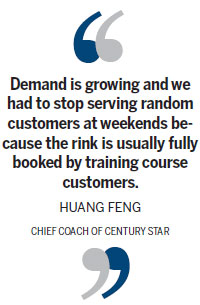Skating fever fuels demand for rinks and training

Every Saturday afternoon, the intense scene on the indoor skating rink at the Beijing shopping mall Joy City is reminiscent of a competitive hockey league.
Passersby are easily attracted to the sound of blades cutting hard on ice, shoulder pads colliding and the chanting of more than 20 children who practice ice hockey in professional outfits on the standard 1,800-square-meter surface for 90 minutes every Saturday.
Yi Shaohan, one of the junior enthusiasts, has been playing hard since his mother Zhou Qin helped him sign up for two extra training sessions a week beginning in early 2012 to feed the 9-year-old's growing passion for the sport.
"He fell in love with hockey just after taking his first class at 7," Zhou told China Daily before sending Yi to the rink. "Since then, he spent almost all of his off-school time on it.
"Playing hockey helps improve his physical coordination as well as his confidence, and the sport has been accepted by more and more elite families as great exercise for boys."
Skating on frozen ponds for fun has long been a tradition for people in North China but not until recently have modern winter sports like figure skating and ice hockey emerged as fashionable forms of winter recreation that appeal to urban youth like Yi.
The trend is fueled by the impressive performance of Chinese athletes at the recent Winter Olympics.
At the Sochi Winter Games in February, China claimed three gold, four silver and two bronze medals, its second-best haul in history. Most of the medals came from its strength in events on ice.

Trying to further push the popularity of winter sports, Beijing and the nearby city Zhangjiakou in Hebei province launched a joint bid in November to host the 2022 Winter Olympics. The ambition has triggered wider participation at the grassroots level, said insiders.
Century Star, China's first commercial ice sports club, currently operates 13 rinks across the country and plans to open at least 10 more this year, most of them in southern China.
Another Beijing-based club, Champion Rink, which now manages 12 facilities, envisions a five-city expansion that will cover more southern provinces.
"Promoted by the Olympics, ice sports are becoming more popular than ever and the governing body's call to develop it in warmer areas in the south will bring us more business opportunities," said Fan Jun, chairman of Century Star and a former national champion skater.
Business is thriving following the recent Olympic fever.
Capital Gymnasium Rink managed by Century Star has been operating at maximum capacity from 1 to 8 pm on almost every workday since the beginning of this year, a phenomenon that used to be seen only at weekends, said Huang Feng, chief coach of Century Star.
"Demand is growing and we had to stop serving random customers at weekends because the rink is usually fully booked by training course customers," Huang said.
Another commercial rink operated by Century Star in the north Beijing suburbs served almost 180,000 skaters last year, a 25 percent increase from 2012, Fan said.
Once an expensive sport with high rental and equipment costs, skating has become affordable with a growing number of public rinks on offer.
Equipment including skates, helmets and kneecaps can be rented at rinks at a low charge and the cost for a 30-minute one-on-one training class varies from 100 yuan ($16) to 300 yuan depending on level of the coach, Huang said.
"An average kid needs about eight classes to be able to skate smoothly, which takes about 2,000 yuan. Most of the parents considered it a great deal," said Huang.
Accessible facilities and lower cost also contribute to the burgeoning number of junior tournaments.
According to the Beijing Hockey Association, there are currently 70 teams with a total of 2,000 children competing in five age categories in the Beijing Minor Hockey Primer League, which was established in 2008.
But the momentum has highlighted the shortage of qualified coaches, which has been the major obstacle for development of ice sports in China.
"We used to hire athletes or trainers retired from northeastern provincial teams but the public demand for elite coaching is growing too fast to be met," Fan said.
Century Star established a coach development program with the Northeast China's Jilin Sport University last year to train and draft graduates as club trainers.
sunxiaochen@chinadaily.com.cn
(China Daily European Weekly 04/18/2014 page19)
Today's Top News
- Takaichi must stop rubbing salt in wounds, retract Taiwan remarks
- Millions vie for civil service jobs
- Chinese landmark trade corridor handles over 5m TEUs
- China holds first national civil service exam since raising eligibility age cap
- Xi's article on CPC self-reform to be published
- Xi stresses improving long-term mechanisms for cyberspace governance






























